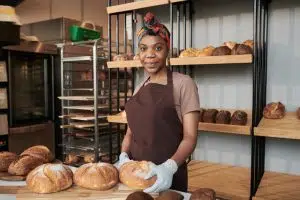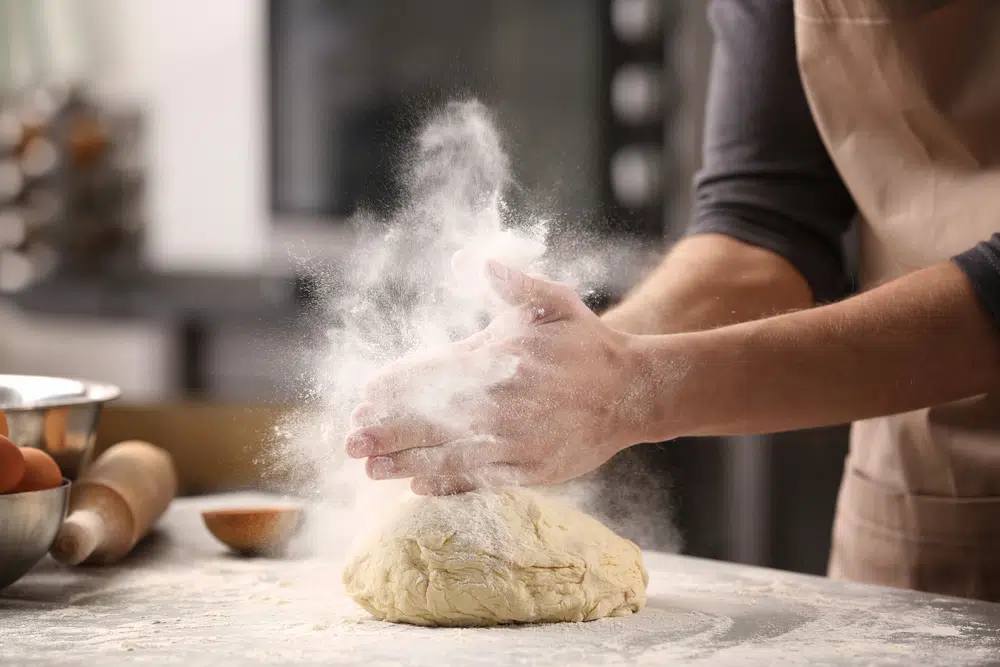 Starting a bakery business in the UK can be a very rewarding experience. Not only will you be able to create delicious treats for your customers, but you’ll also have the opportunity to grow your business and create a name for yourself in the baking industry. However, starting any business can be daunting, so it’s important to do your research and make sure you’re prepared before diving in.
Starting a bakery business in the UK can be a very rewarding experience. Not only will you be able to create delicious treats for your customers, but you’ll also have the opportunity to grow your business and create a name for yourself in the baking industry. However, starting any business can be daunting, so it’s important to do your research and make sure you’re prepared before diving in.
To start a bakery business in the UK, you’ll need to obtain a food hygiene certificate and register your business with your local council. You’ll also need to find a suitable premises from which to operate, and purchase all of the necessary equipment. Once you’ve done all of this, you’ll be ready to start baking!
There are many different types of bakery businesses you could start in the UK. You could open a traditional brick-and-mortar shop, or start a mobile bakery that delivers freshly-baked goods to customers’ doorsteps. You could even start an online bakery and sell your creations through an e-commerce website. Whichever route you choose, make sure you put together a solid business plan and marketing strategy so that you can attract customers and grow your business. With hard work and dedication, you’ll soon be on your way to becoming a successful baker in the UK!
For all the information you need about starting and running your own bakery, have a read through our useful guide below.
Estimating demand for your bakery goods
Estimate how many people might buy your products on a daily basis.
Many different outlets sell bread, cakes, pastries, and other bakery items, so you’ll be facing stiff competition from the likes of:
- Independent bakeries and large chains like Greggs are both examples of retail bakeries
- Supermarkets
- Convenience stores
- Petrol stations
- Sandwich shops
- Cafés
- Health shops – often selling organic, gluten-free and/or dairy-free bread and cakes
- Online retailers such as bakers and cake makers, organic suppliers, or fine food websites
You should find out whether there is room in your area for another bakery outlet. The first thing you should do is to research your competitors. Find out how many bakeries exist in your area and what products they sell. Take note of whether some of these bakeries are independent or chains.
Make a head count of people who shop at an existing local bakery to get an idea of how many people might use your bakery. Keep an eye out for busy days.
Why will customers choose your bakery?
To succeed, you must attract enough customers who will choose your bakery over your competitors, some of whom may be supermarkets which sell bread more cheaply than you can.
After reviewing your immediate competitors’ products, you will have a better idea of what products you should sell to make your business unique. You may decide, for example, that it would be better to focus on patisserie and celebration cakes since local outlets already offer such a wide variety of bread.
Alternatively, you may want to offer only artisan products like organic sourdough and slow fermented bread. You can always add to your range of products once you have established a reputation for certain types of products.
What catchment area will your bakery serve?
Passing trade will be very important to you if you plan to set up a retail bakery. Write down the different types of potential customers who live and work in the area where your business will be located.
Your range of bakery and other items will be determined based on this. At lunchtime, workers and schoolchildren might prefer sandwiches and pasties over cakes and pastries. On their way home, commuters might enjoy shopping for bread and other products.
Remember to consider the location of your proposed bakery – as more people shop in out-of-town retail parks, many high streets are becoming run-down. It’s best to locate your outlet in an area where independent shops are still flourishing.
Find out what products your bakery should produce
Your proposals may be better received if you talk to people in your area. Get as many opinions as you can:
- What sort of products they would like you to offer
- What are the best opening hours for them?
- How they react to the prices you propose – bread, for example, can be very price-sensitive
- If they had a café facility, would they use it
- In general, what they think of your bakery proposal
Will your bakery make trade sales?
The bakery products you make might be sold locally to shops such as small supermarkets or to businesses such as restaurants, cafes, sandwich bars, hotels, nursing homes, etc. It might be worth your time to approach online-only businesses like organic or fine food suppliers and explain how you can supply them with quality food.
You should follow these steps if you plan to target trade customers:
- Make a list of the businesses in your area that are suitable
- Decide what products you will offer them
- Decide how much discount you will offer them off the retail price
- Select a frequency for supplying them. You will need someone to drive the delivery vehicle every day, since most businesses want daily deliveries
- Consider approaching them to see if they are interested – don’t forget to give them a good reason to change if they are already supplied. The product range might be broader, the prices might be lower, or the service might be better.
Your market
Depending on your business, you might have several different types of customers. Here are some examples:
- People who visit your bakery or buy from your mobile shop. It is likely that many of these are local workers looking for breakfast or lunch deals
- Local businesses such as restaurants, hotels, care homes, and child care centres
- Retail outlets and online food specialists who sell your products to trade customers
Estimating the average ‘spend’
You will need to consider how many customers you will have and how much they will spend each time they visit your store when estimating your income. You will be able to estimate the number of customers you will likely have based on your market research.
It is more difficult to estimate how much they will spend. When you were in other bakeries, you may have noticed how much people spent on bread and other items. You need to keep in mind that the market is very competitive and that customers are looking for good value for their money.
Bakery trade sales
Consider approaching some trade customers as part of your market research if you plan to sell to them and establish:
- How many items they would like, and what they would like
- How often they would like them
- Whether they are satisfied with the price you would charge (you will be offering a discount from the normal retail price).
Your average trade customer spend can be estimated using this information.
Special offers and discounts
Consider offering customers a ‘meal deal’ if you produce sandwiches and bakery items for breakfast or lunch. A sandwich, crisps, and drink might cost £3.00 at lunchtime, while each item would cost closer to £4.00 separately.
To reduce wastage, you might offer half-price bread and other bakery items at the end of the day. Be sure to monitor this closely – you don’t want your regular, local customers to forget to pay the full price for their bread until late in the day!
You should also inform your staff about which customers are eligible for discounts and how much they are entitled to. Employees should be careful not to offer unauthorised discounts to their friends and relatives. Identify how much discount you will give to your employees, as well as what, if anything, they can eat on the premises for free. Children and toddlers should be aware of your policy on giving away free bakery items.
Advertising your bakery business
You must get to know your customers, whoever they may be.
To promote your business, you can do the following:
- Distribute a leaflet describing the bakery items that you will manufacture door-to-door, including to local offices
- You can advertise in your local newspaper or other local publications
- Place an advertisement in a local directory. It may be possible to do this online
- Put up a website with pictures of your most tempting product lines. Display seasonal goods, special offers, ‘free from’ bakery items, etc., on the site frequently
- Boost impulse sales with your window display
- Your shop should be marked with a sign on the pavement (Subject to permission by local authority)
- Place publicity materials in a related outlet – for example, a bridal wear store might display details of a local wedding cake shop
- Give your retail customers a taste of new product lines
- Make samples for potential trade customers to sample
- Attend local food fairs or events and set up a stall
- Your packaging should carry your logo, which should indicate the type of bakery goods you sell. If you have a website, include it as well
- Promote new products or seasonal treats on social media like Facebook and Instagram
Decide what services your bakery will offer
You will prepare a baking list every morning, indicating which items and how many need to be baked.
The demand for some products, such as bread, sweets, and savoury products, remains fairly constant throughout the week, although on Saturday you may need to bake more loaves. In the summer, for example, people may cook burgers on their barbecues, so the demand for bakery goods might vary depending on the time of year.
You would only make more when you sold out of other items, such as family fruit cakes. On Fridays and Saturdays, when demand is highest, you may only make some items on order.
In the morning, you bake the items on your baking list. After you finish the bread, you might move on to other bakery products. By the time you open your doors at 9 a.m., you should have most of your goods baked and on the shelves.
During the morning, you might continue baking some items. Pasties and savoury products are often ready by lunchtime so customers can buy them while they are still hot, for example.
Trade deliveries
In order to ensure that retail customers can sell fresh bakery goods all day, you should deliver to them as soon as they open. During the afternoon, when you are less busy, you can deliver to your restaurant customers who only open in the evening.
Lunch time trade
Sandwiches can be prepared and made in the mornings if you plan to sell them. Be sure to comply with food safety legislation when storing perishable items if you make them in advance.
Discounts
During your last hour or two of being open, you might consider discounting bread and other products with a short shelf life to avoid wastage.
Prepare from scratch or bake-off?
By preparing all your bakery products yourself, you can use your own recipes and establish your own reputation. In order to prepare and bake all the goods, you and your bakers will have to get up very early in the morning. Additionally, you will need a large enough space to:
- Store flour and other bulk ingredients
- Prepare and bake everything
- Provide space for all the equipment you will need
Bake-off products are prepared by another, specialist firm and are provided to you chilled or frozen. In your bakery, you finish them off.
This method has the following advantages:
- Preparation time is much shorter, so baking can begin later in the morning
- Preparation waste is reduced
- It is possible to use smaller premises
- There is less equipment needed for preparation
- A wide range of high-quality products is available
Nevertheless, since more and more retail outlets, such as petrol filling station forecourts and convenience stores, are installing these bake-off systems, there is a risk that your products won’t be perceived as sufficiently different or unique. Consider combining homemade and store-bought products, as well as pre-mixes (such as cake mixes). While this might speed up your production, it will also ensure that customers come through your doors rather than the nearby convenience store.
Quality standards
Whatever bakery method you choose, make sure that your premises are clean, smart, and professionally decorated because your customers have grown used to the high standards set by supermarkets. You must display the food hygiene rating that your local authority gives you in Wales and Northern Ireland. In the rest of the UK, voluntary schemes are similar.
What should your bakery sell?
There is still a possibility that you will be able to create loaves that are different enough to attract a lot of customers in spite of the supermarkets’ increasing dominance in the bread market. Customers may also prefer to purchase their bread from you if you are sufficiently far away from a supermarket.
More than half of all bread sold in the UK is white, while brown and wholemeal bread are much less popular. The most popular loaf of bread is white bread, so baking more white bread when producing traditional loaves would be a good idea.
A growing number of smaller craft bakeries offer specialty, artisan, and continental breads such as sourdough bread, soda bread, wheatmeal bread, ciabatta, focaccia, and more. The bakery industry faces a challenge in persuading people to consume more bread – these specialty breads are popular for sandwiches, snacks, and main meals. Besides being more expensive than standard loaves, they also come with an added bonus. Consider whether your local consumers would be interested in these types of premium products.
Also consider developing products that are ‘free-from’ – like dairy, gluten, wheat-free loaves. Make sure you highlight your products with a low salt and sugar content if you want customers to cut down on their intake of sugar and salt.
There are also the following bakery goods to consider:
- Teacakes, buns, scones and pikelets
- Crumpets and muffins
- Rolls and cobs
- Croissants, bagels and brioches
In addition to being ‘impulse buys,’ these products can be purchased at any time of day. As well as sandwiches and burgers, rolls and baps remain popular. Seasonal items like mince pies and hot cross buns will probably be produced at different times of the year. You could offer regional specialties such as bara brith or ginger parkin.
You might decide to focus on confectioneries such as pastries, cakes, and tarts. A range of bespoke celebration cakes can be made for weddings, anniversaries, etc. if you have the appropriate skills.
By offering customers a small sample and asking for their feedback, you can figure out how popular new products are likely to be.
Breakfast trade
The decline in bread demand has led many bakeries to introduce new products to boost sales, and products for the breakfast trade have been particularly successful. People on their way to work are more likely to buy breakfast baguettes and rolls, croissants, pain au chocolat, and Danish pastries. As part of a breakfast deal, many bakeries now include a breakfast item and a hot beverage.
Lunchtime trade
Instead of making sandwiches at home, many workers buy lunch. As well as sandwiches, filled rolls, baguettes, baps, and savoury items such as sausage rolls, pasties, quiches, you could sell a range of savoury products. There has also been an increase in demand for individual cakes such as cupcakes or fruit slices. You might also offer jacket potatoes, hot drinks, soup, and cold drinks if you have enough space.
You might want to offer low-fat sandwiches or smaller portions to customers who are watching their weight. There are also vegan and vegetarian products that you could offer.
Trade sales
Your business may benefit from targeting online fine food specialists that sell bread, bakery products, and sandwiches as potential trade customers.
Providing them with exciting breads and rolls would allow them, in turn, to provide new products to their customers.
It is important to keep in mind that catering establishments of all kinds and sizes require bread, rolls, and other bakery products. Why not offer their buyers a sample pack? Regular orders may result from this.
Conclusion
Starting a bakery can seem daunting, but with the right plan, anyone can turn their passion for baking into a successful business venture. Careful financial planning is essential to establish and maintain the financial resources necessary to fund materials and hire employees if needed. An appropriate location is also important to ensure customers have easy access to your products.
Establishing branding and a presence in the community will help you build a core client base where referrals from satisfied customers can enhance future sales. If done properly, creating a bakery can be an enjoyable experience filled with sweet rewards.
Jarred Musson is a versatile writer with a diverse educational background and a passion for all things business. Holding a Master of Science (MSc) degree in Marketing and a Bachelor of Arts (BA Hons) in Multimedia Journalism from Manchester Metropolitan University, Jarred possesses a unique blend of expertise that allows him to dissect and communicate complex business topics with clarity and precision.


